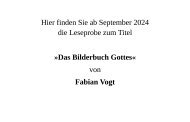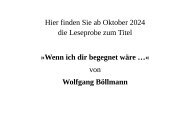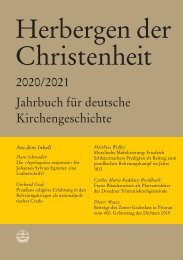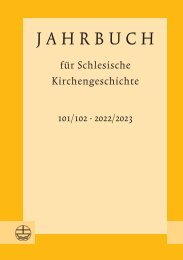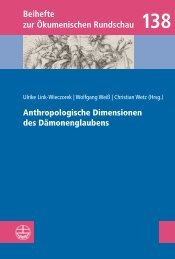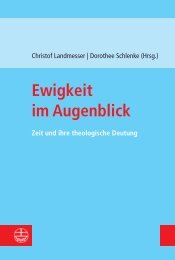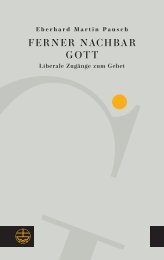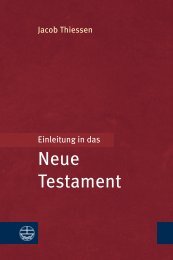Dorothea Erbele-Küster | Volker Küster (Eds.): Between Pandemonium and Pandemethics (Leseprobe)
This volume brings together contextual and intercultural responses to the Covid-19 Pandemic from theological and interreligious perspectives. It searches for models of interpretation provided by religious traditions and their sacred texts, and the ethical guidance religious communities offer for coping with the pandemic. The authors explore imaginative ways that transcend the New Normal towards a »Pantopia« that does not return to the pitfalls of the Old Normal but tackles the injustices that the virus has revealed in the current Pandemonium. They strive to enable their readers to react to the glocal pandemic and its aftermath theologically informed by intercultural and interreligious perspectives.
This volume brings together contextual and intercultural responses to the Covid-19 Pandemic from theological and interreligious perspectives. It searches for models of interpretation provided by religious traditions and their sacred texts, and the ethical guidance religious communities offer for coping with the pandemic. The authors explore imaginative ways that transcend the New Normal towards a »Pantopia« that does not return to the pitfalls of the Old Normal but tackles the injustices that the virus has revealed in the current Pandemonium. They strive to enable their readers to react to the glocal pandemic and its aftermath theologically informed by intercultural and interreligious perspectives.
You also want an ePaper? Increase the reach of your titles
YUMPU automatically turns print PDFs into web optimized ePapers that Google loves.
<strong>Between</strong> <strong>P<strong>and</strong>emonium</strong> <strong>and</strong> P<strong>and</strong>emethics 11<br />
demic, which “have reinforced the existing war paradigm like marketdriven<br />
economy <strong>and</strong> racial ideologies <strong>and</strong> religious discrimination”.<br />
He too underlines the importance of poetic language along several<br />
poems <strong>and</strong> interfaith prayers written in response to the p<strong>and</strong>emic. In<br />
the quoted poetic texts both the specificity <strong>and</strong> complementarity of the<br />
theistic (Judaism, Christianity <strong>and</strong> Islam) <strong>and</strong> non-theistic traditions<br />
(Buddhism, Jainism, Neo-Vedanta Hinduism) become evident. This<br />
may stimulate an interfaith response to hegemonic discourses <strong>and</strong><br />
false polarizations between the divine <strong>and</strong> human.<br />
All contributions highlight main characteristics of the particular<br />
religion <strong>and</strong> its foundational texts including the hermeneutics the different<br />
communities <strong>and</strong> proponents apply. Despite the global character<br />
of the Covid-19 p<strong>and</strong>emic the crisis is perceived quite differently<br />
among the different religious communities: Whereas Carola Roloff<br />
initial question is “What can Buddhism offer to deal with crisis?”,<br />
according to her Buddhism itself is not undergoing a crisis, Annette<br />
Boeckler starts with the observance that Judaism has been challenged<br />
<strong>and</strong> changed by the p<strong>and</strong>emic. Hence, the strategies religious communities<br />
develop to counteract the p<strong>and</strong>emic <strong>and</strong> the way they are affected<br />
or not by the p<strong>and</strong>emic differs mainly due to three factors: (1) the<br />
specific belief systems <strong>and</strong> worldviews of a religious tradition (as expressed<br />
in their sacred texts), (2) the religious rituals <strong>and</strong> (3) the life of<br />
the religious community. Notwithst<strong>and</strong>ing that the p<strong>and</strong>emic confronts<br />
all humans with their vulnerability, the focus among religious communities<br />
may differ. 3<br />
The editors shared in writing a prologue <strong>and</strong> an epilogue to the<br />
contributions of this volume. Opening the toolbox <strong>Volker</strong> <strong>Küster</strong> revisits<br />
liberation theologies as a frame of reference to deal with the<br />
inequalities the virus has revealed. At the same time, he sketches intercultural<br />
p<strong>and</strong>emethics <strong>and</strong> attitudes as well as strategies for imagining<br />
Pantopia as an alternative to the neo-liberal New Normal. Against<br />
the backdrop of the religions of Indian origin Hinduism <strong>and</strong> Buddhism<br />
that view suffering as an integral part of human life that can be coped<br />
with by religious practices such as meditation, <strong>Dorothea</strong> <strong>Erbele</strong>-<br />
<strong>Küster</strong> rereads apocalyptic literature from the perspective of lament as<br />
a counter strategy to tackle with crisis in the so-called Abrahamic religions.<br />
May the contributions in this book foster apocalypso poetical<br />
thinking <strong>and</strong> dream up Pantopia vs the New Normal.<br />
3<br />
See the contributions by Jude Lal Fern<strong>and</strong>o <strong>and</strong> Heike Springhart as well as the epilogue by<br />
<strong>Dorothea</strong> <strong>Erbele</strong>-<strong>Küster</strong>.







